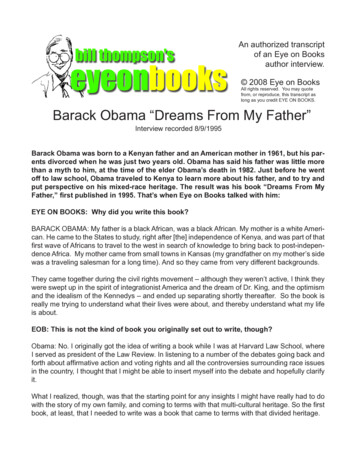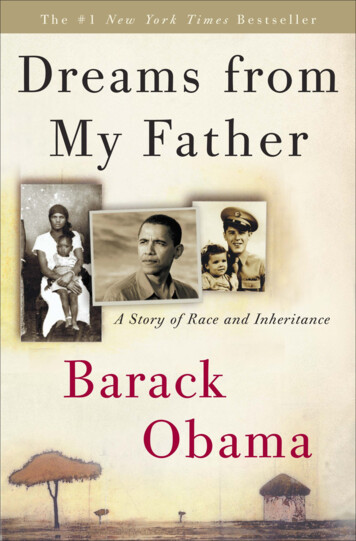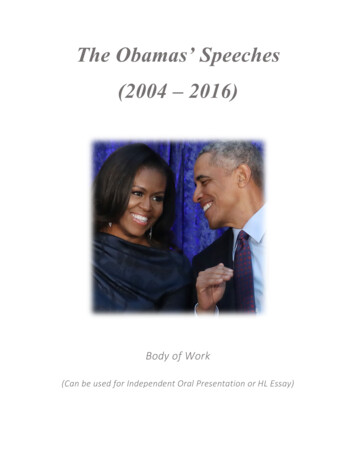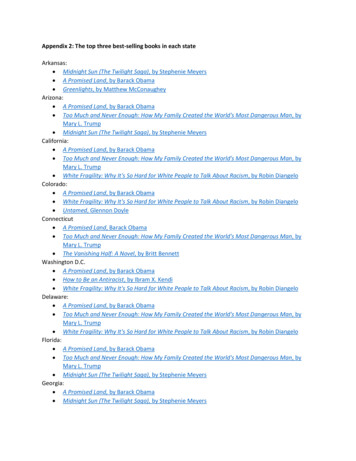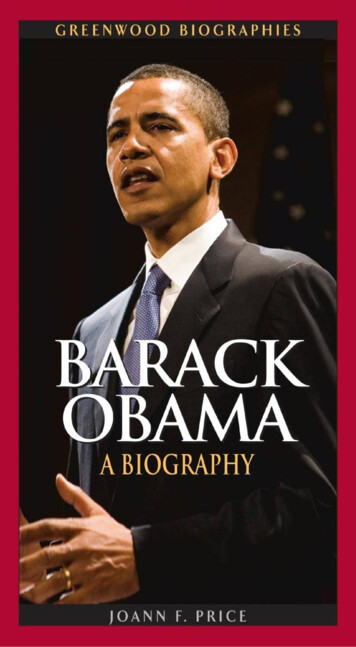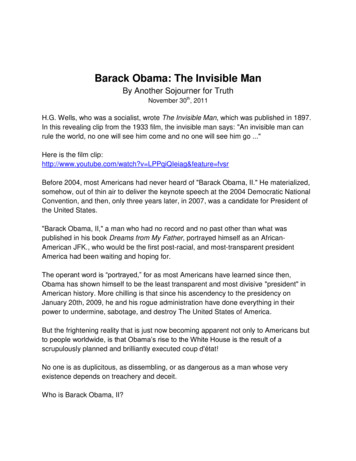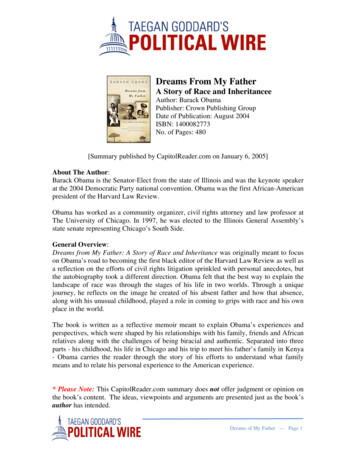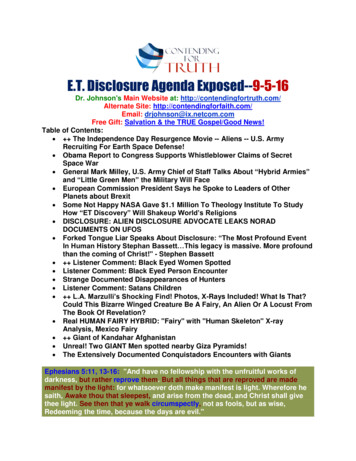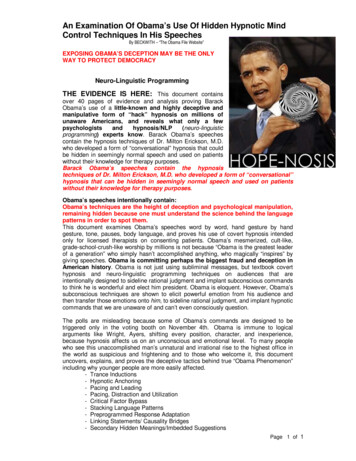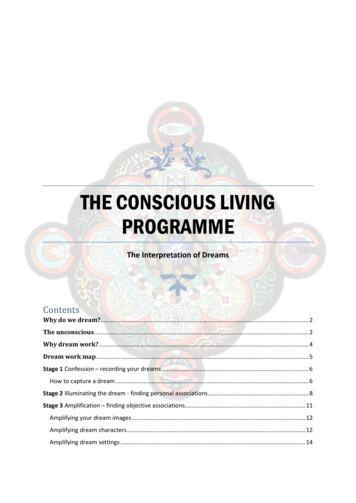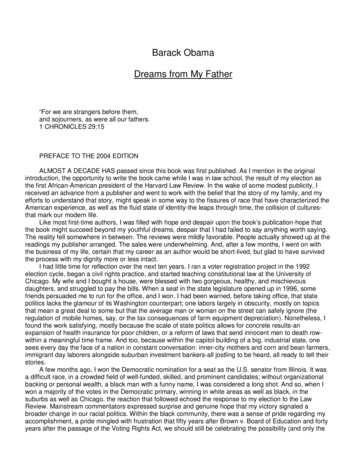
Transcription
Barack ObamaDreams from My Father“For we are strangers before them,and sojourners, as were all our fathers.1 CHRONICLES 29:15PREFACE TO THE 2004 EDITIONALMOST A DECADE HAS passed since this book was first published. As I mention in the originalintroduction, the opportunity to write the book came while I was in law school, the result of my election asthe first African-American president of the Harvard Law Review. In the wake of some modest publicity, Ireceived an advance from a publisher and went to work with the belief that the story of my family, and myefforts to understand that story, might speak in some way to the fissures of race that have characterized theAmerican experience, as well as the fluid state of identity-the leaps through time, the collision of culturesthat mark our modern life.Like most first-time authors, I was filled with hope and despair upon the book’s publication-hope thatthe book might succeed beyond my youthful dreams, despair that I had failed to say anything worth saying.The reality fell somewhere in between. The reviews were mildly favorable. People actually showed up at thereadings my publisher arranged. The sales were underwhelming. And, after a few months, I went on withthe business of my life, certain that my career as an author would be short-lived, but glad to have survivedthe process with my dignity more or less intact.I had little time for reflection over the next ten years. I ran a voter registration project in the 1992election cycle, began a civil rights practice, and started teaching constitutional law at the University ofChicago. My wife and I bought a house, were blessed with two gorgeous, healthy, and mischievousdaughters, and struggled to pay the bills. When a seat in the state legislature opened up in 1996, somefriends persuaded me to run for the office, and I won. I had been warned, before taking office, that statepolitics lacks the glamour of its Washington counterpart; one labors largely in obscurity, mostly on topicsthat mean a great deal to some but that the average man or woman on the street can safely ignore (theregulation of mobile homes, say, or the tax consequences of farm equipment depreciation). Nonetheless, Ifound the work satisfying, mostly because the scale of state politics allows for concrete results-anexpansion of health insurance for poor children, or a reform of laws that send innocent men to death rowwithin a meaningful time frame. And too, because within the capitol building of a big, industrial state, onesees every day the face of a nation in constant conversation: inner-city mothers and corn and bean farmers,immigrant day laborers alongside suburban investment bankers-all jostling to be heard, all ready to tell theirstories.A few months ago, I won the Democratic nomination for a seat as the U.S. senator from Illinois. It wasa difficult race, in a crowded field of well-funded, skilled, and prominent candidates; without organizationalbacking or personal wealth, a black man with a funny name, I was considered a long shot. And so, when Iwon a majority of the votes in the Democratic primary, winning in white areas as well as black, in thesuburbs as well as Chicago, the reaction that followed echoed the response to my election to the LawReview. Mainstream commentators expressed surprise and genuine hope that my victory signaled abroader change in our racial politics. Within the black community, there was a sense of pride regarding myaccomplishment, a pride mingled with frustration that fifty years after Brown v. Board of Education and fortyyears after the passage of the Voting Rights Act, we should still be celebrating the possibility (and only the
possibility, for I have a tough general election coming up) that I might be the sole African American-and onlythe third since Reconstruction-to serve in the Senate. My family, friends, and I were mildly bewildered by theattention, and constantly aware of the gulf between the hard sheen of media reports and the messy,mundane realities of life as it is truly lived.Just as that spate of publicity prompted my publisher’s interest a decade ago, so has this fresh roundof news clippings encouraged the book’s re-publication. For the first time in many years, I’ve pulled out acopy and read a few chapters to see how much my voice may have changed over time. I confess to wincingevery so often at a poorly chosen word, a mangled sentence, an expression of emotion that seemsindulgent or overly practiced. I have the urge to cut the book by fifty pages or so, possessed as I am with akeener appreciation for brevity. I cannot honestly say, however, that the voice in this book is not mine-that Iwould tell the story much differently today than I did ten years ago, even if certain passages have proven tobe inconvenient politically, the grist for pundit commentary and opposition research.What has changed, of course, dramatically, decisively, is the context in which the book might now beread. I began writing against a backdrop of Silicon Valley and a booming stock market; the collapse of theBerlin Wall; Mandela-in slow, sturdy steps-emerging from prison to lead a country; the signing of peaceaccords in Oslo. Domestically, our cultural debates-around guns and abortion and rap lyrics-seemed sofierce precisely because Bill Clinton’s Third Way, a scaled-back welfare state without grand ambition butwithout sharp edges, seemed to describe a broad, underlying consensus on bread-and-butter issues, aconsensus to which even George W. Bush’s first campaign, with its “compassionate conservatism,” wouldhave to give a nod. Internationally, writers announced the end of history, the ascendance of free marketsand liberal democracy, the replacement of old hatreds and wars between nations with virtual communitiesand battles for market share.And then, on September 11, 2001, the world fractured.It’s beyond my skill as a writer to capture that day, and the days that would follow-the planes, likespecters, vanishing into steel and glass; the slow-motion cascade of the towers crumbling into themselves;the ash-covered figures wandering the streets; the anguish and the fear. Nor do I pretend to understand thestark nihilism that drove the terrorists that day and that drives their brethren still. My powers of empathy, myability to reach into another’s heart, cannot penetrate the blank stares of those who would murder innocentswith abstract, serene satisfaction.What I do know is that history returned that day with a vengeance; that, in fact, as Faulkner remindsus, the past is never dead and buried-it isn’t even past. This collective history, this past, directly touches myown. Not merely because the bombs of Al Qaeda have marked, with an eerie precision, some of thelandscapes of my life-the buildings and roads and faces of Nairobi, Bali, Manhattan; not merely because, asa consequence of 9/11, my name is an irresistible target of mocking websites from overzealous Republicanoperatives. But also because the underlying struggle-between worlds of plenty and worlds of want; betweenthe modern and the ancient; between those who embrace our teeming, colliding, irksome diversity, whilestill insisting on a set of values that binds us together, and those who would seek, under whatever flag orslogan or sacred text, a certainty and simplification that justifies cruelty toward those not like us-is thestruggle set forth, on a miniature scale, in this book.I know, I have seen, the desperation and disorder of the powerless: how it twists the lives of childrenon the streets of Jakarta or Nairobi in much the same way as it does the lives of children on Chicago’sSouth Side, how narrow the path is for them between humiliation and untrammeled fury, how easily they slipinto violence and despair. I know that the response of the powerful to this disorder-alternating as it doesbetween a dull complacency and, when the disorder spills out of its proscribed confines, a steady,unthinking application of force, of longer prison sentences and more sophisticated military hardware-isinadequate to the task. I know that the hardening of lines, the embrace of fundamentalism and tribe, doomsus all.And so what was a more interior, intimate effort on my part, to understand this struggle and to find myplace in it, has converged with a broader public debate, a debate in which I am professionally engaged, onethat will shape our lives and the lives of our children for many years to come.The policy implications of all this are a topic for another book. Let me end instead on a more personalnote. Most of the characters in this book remain a part of my life, albeit in varying degrees-a function ofwork, children, geography, and turns of fate.The exception is my mother, whom we lost, with a brutal swiftness, to cancer a few months after thisbook was published.
She had spent the previous ten years doing what she loved. She traveled the world, working in thedistant villages of Asia and Africa, helping women buy a sewing machine or a milk cow or an education thatmight give them a foothold in the world’s economy. She gathered friends from high and low, took longwalks, stared at the moon, and foraged through the local markets of Delhi or Marrakesh for some trifle, ascarf or stone carving that would make her laugh or please the eye. She wrote reports, read novels,pestered her children, and dreamed of grandchildren.We saw each other frequently, our bond unbroken. During the writing of this book, she would read thedrafts, correcting stories that I had misunderstood, careful not to comment on my characterizations of herbut quick to explain or defend the less flattering aspects of my father’s character. She managed her illnesswith grace and good humor, and she helped my sister and me push on with our lives, despite our dread, ourdenials, our sudden constrictions of the heart.I think sometimes that had I known she would not survive her illness, I might have written a differentbook-less a meditation on the absent parent, more a celebration of the one who was the single constant inmy life. In my daughters I see her every day, her joy, her capacity for wonder. I won’t try to describe howdeeply I mourn her passing still. I know that she was the kindest, most generous spirit I have ever known,and that what is best in me I owe to her.INTRODUCTIONI ORIGINALLY INTENDED A VERY different book. The opportunity to write it first arose while I was stillin law school, after my election as the first black president of the Harvard Law Review, a legal periodicallargely unknown outside the profession. A burst of publicity followed that election, including severalnewspaper articles that testified less to my modest accomplishments than to Harvard Law School’s peculiarplace in the American mythology, as well as America’s hunger for any optimistic sign from the racial front-amorsel of proof that, after all, some progress has been made. A few publishers called, and I, imaginingmyself to have something original to say about the current state of race relations, agreed to take off a yearafter graduation and put my thoughts to paper.In that last year of law school, I began to organize in my mind, with a frightening confidence, just howthe book would proceed. There would be an essay on the limits of civil rights litigation in bringing aboutracial equality, thoughts on the meaning of community and the restoration of public life through grassrootsorganizing, musings on affirmative action and Afrocentrism-the list of topics filled an entire page. I’d includepersonal anecdotes, to be sure, and analyze the sources of certain recurring emotions. But all in all it wasan intellectual journey that I imagined for myself, complete with maps and restpoints and a strict itinerary:the first section completed by March, the second submitted for revision in August .When I actually sat down and began to write, though, I found my mind pulled toward rockier shores.First longings leapt up to brush my heart. Distant voices appeared, and ebbed, and then appeared again. Iremembered the stories that my mother and her parents told me as a child, the stories of a family trying toexplain itself. I recalled my first year as a community organizer in Chicago and my awkward steps towardmanhood. I listened to my grandmother, sitting under a mango tree as she braided my sister’s hair,describing the father I had never truly known.Compared to this flood of memories, all my well-ordered theories seemed insubstantial and premature.Still, I strongly resisted the idea of offering up my past in a book, a past that left me feeling exposed, evenslightly ashamed. Not because that past is particularly painful or perverse but because it speaks to thoseaspects of myself that resist conscious choice and that-on the surface, at least-contradict the world I nowoccupy. After all, I’m thirty-three now; I work as a lawyer active in the social and political life of Chicago, atown that’s accustomed to its racial wounds and prides itself on a certain lack of sentiment. If I’ve been ableto fight off cynicism, I nevertheless like to think of myself as wise to the world, careful not to expect toomuch.And yet what strikes me most when I think about the story of my family is a running strain of innocence,an innocence that seems unimaginable, even by the measures of childhood. My wife’s cousin, only sixyears old, has already lost such innocence: A few weeks ago he reported to his parents that some of hisfirst grade classmates had refused to play with him because of his dark, unblemished skin. Obviously hisparents, born and raised in Chicago and Gary, lost their own innocence long ago, and although they aren’t
bitter-the two of them being as strong and proud and resourceful as any parents I know-one hears the painin their voices as they begin to have second thoughts about having moved out of the city into a mostly whitesuburb, a move they made to protect their son from the possibility of being caught in a gang shooting andthe certainty of attending an underfunded school.They know too much, we have all seen too much, to take my parents’ brief union-a black man andwhite woman, an African and an American-at face value. As a result, some people have a hard time takingme at face value. When people who don’t know me well, black or white, discover my background (and it isusually a discovery, for I ceased to advertise my mother’s race at the age of twelve or thirteen, when Ibegan to suspect that by doing so I was ingratiating myself to whites), I see the split-second adjustmentsthey have to make, the searching of my eyes for some telltale sign. They no longer know who I am.Privately, they guess at my troubled heart, I suppose-the mixed blood, the divided soul, the ghostly image ofthe tragic mulatto trapped between two worlds. And if I were to explain that no, the tragedy is not mine, or atleast not mine alone, it is yours, sons and daughters of Plymouth Rock and Ellis Island, it is yours, childrenof Africa, it is the tragedy of both my wife’s six-year-old cousin and his white first grade classmates, so thatyou need not guess at what troubles me, it’s on the nightly news for all to see, and that if we couldacknowledge at least that much then the tragic cycle begins to break down well, I suspect that I soundincurably naive, wedded to lost hopes, like those Communists who peddle their newspapers on the fringesof various college towns. Or worse, I sound like I’m trying to hide from myself.I don’t fault people their suspicions. I learned long ago to distrust my childhood and the stories thatshaped it. It was only many years later, after I had sat at my father’s grave and spoken to him throughAfrica’s red soil, that I could circle back and evaluate these early stories for myself. Or, more accurately, itwas only then that I understood that I had spent much of my life trying to rewrite these stories, plugging upholes in the narrative, accommodating unwelcome details, projecting individual choices against the blindsweep of history, all in the hope of extracting some granite slab of truth upon which my unborn children canfirmly stand.At some point, then, in spite of a stubborn desire to protect myself from scrutiny, in spite of the periodicimpulse to abandon the entire project, what has found its way onto these pages is a record of a personal,interior journey-a boy’s search for his father, and through that search a workable meaning for his life as ablack American. The result is autobiographical, although whenever someone’s asked me over the course ofthese last three years just what the book is about, I’ve usually avoided such a description. An autobiographypromises feats worthy of record, conversations with famous people, a central role in important events.There is none of that here. At the very least, an autobiography implies a summing up, a certain closure, thathardly suits someone of my years, still busy charting his way through the world. I can’t even hold up myexperience as being somehow representative of the black American experience (“After all, you don’t comefrom an underprivileged background,” a Manhattan publisher helpfully points out to me); indeed, learning toaccept that particular truth-that I can embrace my black brothers and sisters, whether in this country or inAfrica, and affirm a common destiny without pretending to speak to, or for, all our various struggles-is part ofwhat this book’s about.Finally, there are the dangers inherent in any autobiographical work: the temptation to color events inways favorable to the writer, the tendency to overestimate the interest one’s experiences hold for others,selective lapses of memory. Such hazards are only magnified when the writer lacks the wisdom of age; thedistance that can cure one of certain vanities. I can’t say that I’ve avoided all, or any, of these hazardssuccessfully. Although much of this book is based on contemporaneous journals or the oral histories of myfamily, the dialogue is necessarily an approximation of what was actually said or relayed to me. For thesake of compression, some of the characters that appear are composites of people I’ve known, and someevents appear out of precise chronology. With the exception of my family and a handful of public figures, thenames of most characters have been changed for the sake of their privacy.Whatever the label that attaches to this book-autobiography, memoir, family history, or something elsewhat I’ve tried to do is write an honest account of a particular province of my life. When I’ve strayed, I’vebeen able to look to my agent, Jane Dystel, for her faith and tenacity; to my editor, Henry Ferris, for hisgentle but firm correctives; to Ruth Fecych and the staff at Times Books, for their enthusiasm and attentionin shepherding the manuscript through its various stages; to my friends, especially Robert Fisher, for theirgenerous readings; and to my wonderful wife, Michelle, for her wit, grace, candor, and unerring ability toencourage my best impulses.
It is to my family, though-my mother, my grandparents, my siblings, stretched across oceans andcontinents-that I owe the deepest gratitude and to whom I dedicate this book. Without their constant loveand support, without their willingness to let me sing their song and their toleration of the occasional wrongnote, I could never have hoped to finish. If nothing else, I hope that the love and respect I feel for themshines through on every page.CHAPTER ONEA FEW MONTHS AFTER MY twenty-first birthday, a stranger called to give me the news. I was livingin New York at the time, on Ninety-fourth between Second and First, part of that unnamed, shifting borderbetween East Harlem and the rest of Manhattan. It was an uninviting block, treeless and barren, lined withsoot-colored walk-ups that cast heavy shadows for most of the day. The apartment was small, with slantingfloors and irregular heat and a buzzer downstairs that didn’t work, so that visitors had to call ahead from apay phone at the corner gas station, where a black Doberman the size of a wolf paced through the night invigilant patrol, its jaws clamped around an empty beer bottle.None of this concerned me much, for I didn’t get many visitors. I was impatient in those days, busy withwork and unrealized plans, and prone to see other people as unnecessary distractions. It wasn’t that I didn’tappreciate company exactly. I enjoyed exchanging Spanish pleasantries with my mostly Puerto Ricanneighbors, and on my way back from classes I’d usually stop to talk to the boys who hung out on the stoopall summer long about the Knicks or the gunshots they’d heard the night before. When the weather wasgood, my roommate and I might sit out on the fire escape to smoke cigarettes and study the dusk washingblue over the city, or watch white people from the better neighborhoods nearby walk their dogs down ourblock to let the animals shit on our curbs-“Scoop the poop, you bastards!” my roommate would shout withimpressive rage, and we’d laugh at the faces of both master and beast, grim and unapologetic as theyhunkered down to do the deed.I enjoyed such moments-but only in brief. If the talk began to wander, or cross the border intofamiliarity, I would soon find reason to excuse myself. I had grown too comfortable in my solitude, the safestplace I knew.I remember there was an old man living next door who seemed to share my disposition. He lived alone,a gaunt, stooped figure who wore a heavy black overcoat and a misshapen fedora on those rare occasionswhen he left his apartment. Once in a while I’d run into him on his way back from the store, and I would offerto carry his groceries up the long flight of stairs. He would look at me and shrug, and we would begin ourascent, stopping at each landing so that he could catch his breath. When we finally arrived at his apartment,I’d carefully set the bags down on the floor and he would offer a courtly nod of acknowledgment beforeshuffling inside and closing the latch. Not a single word would pass between us, and not once did he everthank me for my efforts.The old man’s silence impressed me; I thought him a kindred spirit. Later, my roommate would find himcrumpled up on the third-floor landing, his eyes wide open, his limbs stiff and curled up like a baby’s. Acrowd gathered; a few of the women crossed themselves, and the smaller children whispered withexcitement. Eventually the paramedics arrived to take away the body and the police let themselves into theold man’s apartment. It was neat, almost empty-a chair, a desk, the faded portrait of a woman with heavyeyebrows and a gentle smile set atop the mantelpiece. Somebody opened the refrigerator and found closeto a thousand dollars in small bills rolled up inside wads of old newspaper and carefully arranged behindmayonnaise and pickle jars.The loneliness of the scene affected me, and for the briefest moment I wished that I had learned theold man’s name. Then, almost immediately, I regretted my desire, along with its companion grief. I felt as ifan understanding had been broken between us-as if, in that barren room, the old man was whispering anuntold history, telling me things I preferred not to hear.It must have been a month or so later, on a cold, dreary November morning, the sun faint behind agauze of clouds, that the other call came. I was in the middle of making myself breakfast, with coffee on thestove and two eggs in the skillet, when my roommate handed me the phone. The line was thick with static.
“Barry? Barry, is this you?”“Yes . Who’s this?”“Yes, Barry this is your Aunt Jane. In Nairobi. Can you hear me?”“I’m sorry-who did you say you were?”“Aunt Jane. Listen, Barry, your father is dead. He is killed in a car accident. Hello? Can you hear me? Isay, your father is dead. Barry, please call your uncle in Boston and tell him. I can’t talk now, okay, Barry. Iwill try to call you again .”That was all. The line cut off, and I sat down on the couch, smelling eggs burn in the kitchen, staring atcracks in the plaster, trying to measure my loss.At the time of his death, my father remained a myth to me, both more and less than a man. He had leftHawaii back in 1963, when I was only two years old, so that as a child I knew him only through the storiesthat my mother and grandparents told. They all had their favorites, each one seamless, burnished smoothfrom repeated use. I can still picture Gramps leaning back in his old stuffed chair after dinner, sippingwhiskey and cleaning his teeth with the cellophane from his cigarette pack, recounting the time that myfather almost threw a man off the Pali Lookout because of a pipe .“See, your mom and dad decided to take this friend of his sightseeing around the island. So they droveup to the Lookout, and Barack was probably on the wrong side of the road the whole way over there-”“Your father was a terrible driver,” my mother explains to me. “He’d end up on the left-hand side, theway the British drive, and if you said something he’d just huff about silly American rules-”“Well, this particular time they arrived in one piece, and they got out and stood at the railing to admirethe view. And Barack, he was puffing away on this pipe that I’d given him for his birthday, pointing out all thesights with the stem, like a sea captain-”“Your father was really proud of this pipe,” my mother interrupts again. “He’d smoke it all night while hestudied, and sometimes-”“Look, Ann, do you want to tell the story or are you going to let me finish?”“Sorry, Dad. Go ahead.”“Anyway, this poor fella-he was another African student, wasn’t he? Fresh off the boat. This poor kidmust’ve been impressed with the way Barack was holding forth with this pipe, ’cause he asked if he couldgive it a try. Your dad thought about it for a minute, and finally agreed, and as soon as the fella took his firstpuff, he started coughing up a fit. Coughed so hard that the pipe slipped out of his hand and dropped overthe railing, a hundred feet down the face of the cliff.”Gramps stops to take another nip from his flask before continuing. “Well, now, your dad was graciousenough to wait until his friend stopped coughing before he told him to climb over the railing and bring thepipe back. The man took one peek down this ninety-degree incline and told Barack that he’d buy him areplacement-”“Quite sensibly,” Toot says from the kitchen. (We call my grandmother Tutu, Toot for short; it means“grandparent” in Hawaiian, for she decided on the day I was born that she was still too young to be calledGranny.) Gramps scowls but decides to ignore her.“-but Barack was adamant about getting his pipe back, because it was a gift and couldn’t be replaced.So the fella took another look, and shook his head again, and that’s when your dad picked him clear off theground and started dangling him over the railing!”Gramps lets out a hoot and gives his knee a jovial slap. As he laughs, I imagine myself looking up atmy father, dark against the brilliant sun, the transgressor’s arms flailing about as he’s held aloft. A fearsomevision of justice.“He wasn’t really holding him over the railing, Dad,” my mother says, looking to me with concern, butGramps takes another sip of whiskey and plows forward.“At this point, other people were starting to stare, and your mother was begging Barack to stop. I guessBarack’s friend was just holding his breath and saying his prayers. Anyway, after a couple of minutes, yourdad set the man back down on his feet, patted him on the back, and suggested, calm as you please, thatthey all go find themselves a beer. And don’t you know, that’s how your dad acted for the rest of the tourlike nothing happened. Of course, your mother was still pretty upset when they got home. In fact, she wasbarely talking to your dad. Barack wasn’t helping matters any, either, ’cause when your mother tried to tellus what had happened he just shook his head and started to laugh. ‘Relax, Anna,’ he said to her-your dadhad this deep baritone, see, and this British accent.” My grandfather tucks his chin into his neck at this
point, to capture the full effect. “‘Relax, Anna,’ he said. ‘I only wanted to teach the chap a lesson about theproper care of other people’s property!’ ”Gramps would start to laugh again until he started to cough, and Toot would mutter under her breaththat she supposed it was a good thing that my father had realized that dropping the pipe had just been anaccident because who knows what might have happened otherwise, and my mother would roll her eyes atme and say they were exaggerating.“Your father can be a bit domineering,” my mother would admit with a hint of a smile. “But it’s just thathe is basically a very honest person. That makes him uncompromising sometimes.”She preferred a gentler portrait of my father. She would tell the story of when he arrived to accept hisPhi Beta Kappa key in his favorite outfit-jeans and an old knit shirt with a leopard-print pattern. “Nobody toldhim it was this big honor, so he walked in and found everyone standing around this elegant room dressed intuxedos. The only time I ever saw him embarrassed.”And Gramps, suddenly thoughtful, would start nodding to himself “It’s a fact, Bar,” he would say. “Yourdad could handle just about any situation, and that made everybody like him. Remember the time he had tosing at the International Music Festival? He’d agreed to sing some African songs, but when he arrived itturned out to be this big to-do, and the woman who performed just before him was a semi-professionalsinger, a Hawaiian gal with a full band to back her up. Anyone else would have stopped right there, youknow, and explained that there had been a mistake. But not Barack. He got up and started singing in frontof this big crowd-which is no easy feat, let me tell you-and he wasn’t great, but he was so sure of himselfthat before you knew it he was getting as much applause as anybody.”My grandfather would shake his head and get out of his chair t
Barack Obama Dreams from My Father "For we are strangers before them, and sojourners, as were all our fathers. 1 CHRONICLES 29:15 . but quick to explain or defend the less flattering aspects of my father's character. She managed her illness with grace and good humor, and she helped my sister and me push on with our lives, despite our .
